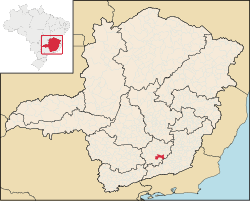Barbacena
Barbacena | |
|---|---|
| Barbacena; image by Pedro Wilson Ayres Pinto Barbacena; image by Pedro Wilson Ayres Pinto | |
 Location in Minas Gerais | |
| Country | Brazil |
| Region | Southeast |
| State | Minas Gerais |
| Founded | 1791 |
| Government | |
| • Mayor | Antônio Carlos Doorgal de Andrada (PSB) |
| Area | |
| • Total | 759.19 km2 (293.12 sq mi) |
| Elevation | 1,160 m (3,810 ft) |
| Population (2013)[1] | |
| • Total | 132,980 |
| • Density | 158/km2 (410/sq mi) |
| Demonym | Barbacenense |
| Time zone | UTC-3 (UTC-3) |
| • Summer (DST) | UTC-2 (UTC-2) |
| Postal code | 36200 |
| Area code | (+55) 32 |
| Website | http://www.barbacena.mg.gov.br/ Template:Pt icon |
Barbacena is a municipality in the state of Minas Gerais, Brazil. As of 2013, the municipality had 132,980 inhabitants. The total area of the municipality is 788 km2 (304 sq mi).
It is in the foothills of the Serra da Mantiqueira south of the state capital Belo Horizonte at an elevation of 1,136 m (3,727 ft), making it one of the ten highest cities in Brazil. Located on the important BR-040 highway (also called Rodovia JK), which links Brasília to Rio de Janeiro, it is 165 km (103 mi) from the state capital and 97 km (60 mi) Juiz de Fora.
Barbacena has a humid tropical climate with cool summers due to the elevation. Summer averages are 24 °C (75 °F) and winter averages 13 °C (55 °F). The cool climate and abundant rainfall have made Barbacena a center for flower production — the city is the biggest producer of flowers in Minas Gerais, and is nicknamed "City of Roses". Cattle raising and the dairy industry are quite developed and the city is a big producer of milk products; there are also several small textile factories.
Barbacena is also the home of the Preparatory School of Air Cadets (the sixteenth best high school of the country,[2] which belongs to the Brazilian Air Force) and of a Medical School, Faculdade de Medicina de Barbacena (Faculty of Medicine of Barbacena). The city is also famous for the Hospital Colônia de Barbacena, a mental hospital founded in 1903, which was known for its abusive treatment of patients.[3] According to sources, 70% of the patients did not have mental illness,[3] and allegedly 60,000 people died in the hospital.[3] It ceased operations in the mid-1980s. It has been compared to a Nazi concentration camp.[3]
Barbacena was the birthplace of the human rights activist and lawyer Heráclito Fontoura Sobral Pinto.
Barbacena was a station on the Estrada de Ferro Oeste de Minas, a narrow gauge railway.
History
Barbacena was founded on 14 August 1791.
In the 19th century, Barbacena was a principal distribution center for the mining districts of Minas Gerais, but this distinction was lost when the railways were extended beyond that point.[4]
Sister cities
Barbacena has one sister city, as designated by Sister Cities International:
![]() Burlington, Iowa, USA
Burlington, Iowa, USA
References
- ^ "Estimativas das Populações Residentes, em 01.07.2010, Segundo os Municípios" (PDF) (in Portuguese). IBGE. Archived from the original (PDF) on 22 September 2006. Retrieved 1 September 2006.
{{cite web}}: Unknown parameter|deadurl=ignored (|url-status=suggested) (help) - ^ UOL Educação (2008). "Ranking das 20 melhores escolas do Brasil do Enem 2008" (in Portuguese). Retrieved 6 October 2009.
- ^ a b c d Daniela Arbex (2011). "Holocausto Brasileiro: 50 anos sem punição (Brazilian Holocaust: 50 years without punishment)" (in Portuguese). Retrieved 10 November 2013.
- ^ One or more of the preceding sentences incorporates text from a publication now in the public domain: Chisholm, Hugh, ed. (1911). "Barbacena". Encyclopædia Britannica. Vol. 3 (11th ed.). Cambridge University Press.



